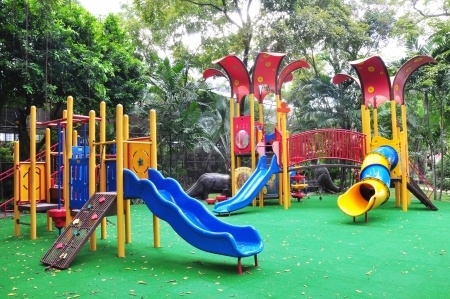Concussions From Playground Equipment Use On the Rise
June 1, 2016 | Category: Child Injuries | ShareWhen thinking about protecting children from concussions, parents usually worry about sports injuries, probably because there are so many news stories about these injuries such as those on football fields. However, children obtaining concussions when using playground equipment are on the rise.  Traumatic brain injuries (TBI) from using play equipment in backyards, at schools and in parks were reported in recent government research published this month in Pediatrics. The CDC (Centers for Disease Control and Prevention) reported in the study that children, ages 14 and younger, were suffering from concussions from playground equipment more frequently than prior studies had shown.
Traumatic brain injuries (TBI) from using play equipment in backyards, at schools and in parks were reported in recent government research published this month in Pediatrics. The CDC (Centers for Disease Control and Prevention) reported in the study that children, ages 14 and younger, were suffering from concussions from playground equipment more frequently than prior studies had shown.
The data examined for the national study was from the twelve-year period, 2001-2013 and included children who received emergency-room treatment and were treated for only nonfatal traumatic brain injuries, including concussions. Almost 215,000 children on average were treated annually, of which close to 10 percent, or 21,000 annually, had traumatic brain injuries.
According to Brainline.org in 2011:
- Over 200,000 children visit emergency rooms each year due to playground-related injuries.
- 15 percent of child fatalities occur each year from playground equipment.
- 79 percent of all playground injuries involve falls. Falls also account for 90 percent of the most severe playground injuries.
What causes concussions?
Honor Health, a merger of Scottsdale Healthcare and John C. Lincoln Health Network in Arizona, says that, “Normally, the brain floats within the skull, surrounded by a protective cushioning of spinal fluid. While the skull protects the brain from injury, it cannot absorb the full force of a traumatic impact. Any sudden blow to the head, or even a rapid deceleration when driving, can cause a concussion. As the brain bounces against the inner wall of the skull, blood vessels can be torn, nerve fibers can be stretched, and the brain can be bruised. Each of these can lead to bleeding and swelling within the skull.
What are the signs and symptoms of concussions?
According to the Mayo Clinic the signs can be subtle and may not be immediately apparent. Symptoms can last for days, weeks or even longer. Signs and symptoms of a concussion may include:
- Headache or a feeling of pressure in the head
- Temporary loss of consciousness, amnesia
- Confusion or feeling as if in a fog, Dizziness or "seeing stars"
- Ringing in the ears
- Nausea, vomiting
- Slurred speech
- Delayed response to questions
- Fatigue
The CPSC (Consumer Product Safety Commission) recognizes the safety hazards that may be present when using playground equipment. The organization recommends the following Public Playground Safety Checklist:
- Make sure surfaces around playground equipment have at least 12 inches of wood chips, mulch, sand, or pea gravel, or are mats made of safety-tested rubber or rubber-like materials.
- Check that protective surfacing extends at least 6 feet in all directions from play equipment. For swings, be sure surfacing extends, in back and front, twice the height of the suspending bar.
- Make sure play structures more than 30 inches high are spaced at least 9 feet apart.
- Check for dangerous hardware, like open "S" hooks or protruding bolt ends.
- Make sure spaces that could trap children, such as openings in guardrails or between ladder rungs, measure less than 3.5 inches or more than 9 inches.
- Check for sharp points or edges in equipment.
- Look out for tripping hazards, like exposed concrete footings, tree stumps, and rocks.
- Make sure elevated surfaces, like platforms and ramps, have guardrails to prevent falls.
- Check playgrounds regularly to see that equipment and surfacing are in good condition.
- Carefully supervise children on playgrounds to make sure they're safe.
The National Recreation and Park Association (NRPA) estimates that 40 percent of playground injuries are associated with a lack of supervision for children. The association feels that young children, 14 and younger, are constantly challenging their own abilities, and often are not able to recognize potential hazards. Children should be observed by parents and caregivers at all times to reduce the possibility of accidents. NRPA recommends that special attention be paid to a child’s clothing, as drawstrings and jewelry can become entangled in equipment and protruding hardware, and can cause death by strangulation.
“Playground safety is the responsibility of many starting with the fact that the playground equipment must always be in good working order and not represent a hazard to the public,” said Fort Myers Child Injury Attorney, Randall Spivey of Spivey Law Firm, Personal Injury Attorneys, P.A. “If your child is seriously injured in a playground accident caused by poor maintenance or design of playground equipment, contact our experienced attorneys.”
Fort Myers Child Injuries Attorney, Randall L. Spivey is a Board Certified Civil Trial Attorney – the highest recognition for competence bestowed by the Florida Bar and a distinction earned by less than 2 percent of Florida attorneys. He has handled over 1,600 personal injury and wrongful death cases throughout Florida. For a free and confidential consultation to discuss your legal rights, contact the Spivey Law Firm, Personal Injury Attorneys, P.A., in Lee County at 239. 337.7483 or toll free at 1.888.477.4839, or by email to Randall@SpiveyLaw.com. Visit SpiveyLaw.com for more information. You can contact Spivey Law Firm, Personal Injury Attorneys, P.A. in Charlotte County at 941.764.7748 and in Collier County 239.793.7748.

